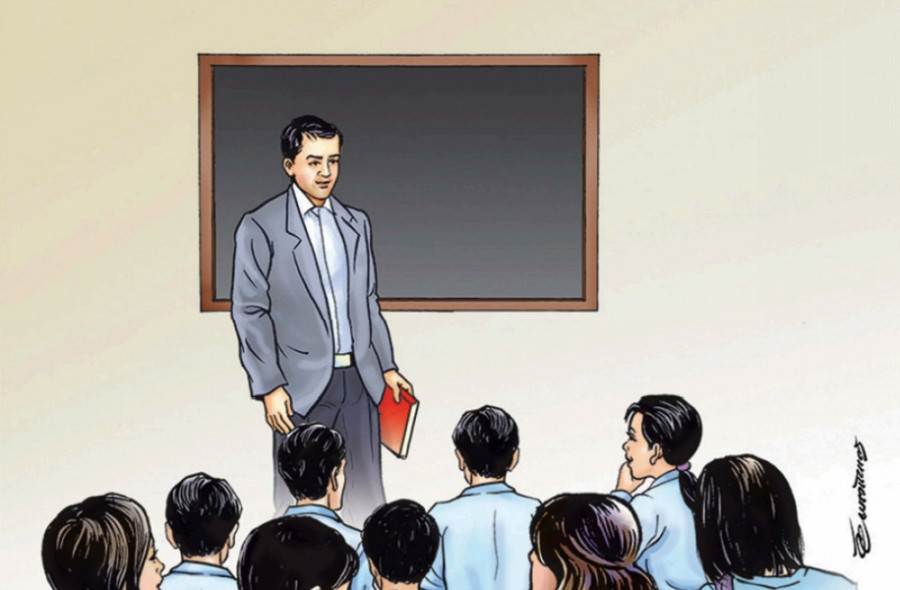National
School teachers attend party general conventions ignoring court order
Status quo will continue until political parties themselves discourage such practices, expert says.
Binod Ghimire
The Patan High Court on October 5 ordered that school teachers cannot engage in active politics. Responding to a writ petition, the court said those drawing salary and benefits from the state coffers should not be involved in party politics.
The ruling was issued to stop school teachers from contesting in different levels of elections of the Nepali Congress and the CPN-UML in the run-up to the parties’ conventions. While hundreds of teachers have become members of different committees of the ruling and the main opposition parties, many of them are delegates in the general conventions.
Despite the high court’s ruling and concerns from the Election Commission, the teachers continue to participate in the party’s general convention. The commission on November 23 had said the participation of teachers, professors or other government employees was against the Political Parties Act, 2017.
After this, the Centre for Education and Human Resource Development, under the Ministry of Education, on Friday asked all the local governments and education units at the district level to implement the ruling.
However, that has not stopped Meena Khadka, a teacher from Gaighat Secondary School in Udayapur, from participating in the Nepali Congress general convention. She is among 4,743 representatives of the ruling party waiting to vote on Monday to elect a new leadership in the party.
“In Nepal, teachers have long remained associated with political parties. I don’t know if there is a restriction for the teachers to become delegates,” she told the Post. “I am not alone. Dozens of teachers have been elected as delegates for this convention.” Along with Khadka, 263 delegates, over five percent, in the ongoing national congress of the ruling party are teachers.
The main opposition UML also had dozens of teachers as representatives in the party’s 10th general congress held last month. “We have asked the local governments to take action against such teachers,” Suresh Kumar Joshi, spokesperson at the Centre, told the Post. “They would have sought written clarifications from such teachers and they could be subjected to departmental actions.”
The need for keeping teachers out of politics has long been a subject of public discussion. However, teachers continue to engage in partisan politics because the political parties are happy with the status quo.
For instance, CPN (Maoist Centre) Chairperson Pushpa Kamal Dahal on November 23 objected to the Election Commission’s call to keep teachers from party politics. Dahal claimed the party system will weaken if teachers are barred from politics. He said teachers should have even more engagement in politics for ‘social transformation’.
The High Level National Education Commission formed by the erstwhile Prime Minister KP Sharma Oli government had concluded that politicisation was one of the major factors responsible for the degradation of education at school and university. In its report submitted to Oli on January 15, 2019, the commission recommended barring school and university teachers from party politics. The report, prepared by a group of education experts and stakeholders spending millions of rupees from the state coffers, was never made public.
Education experts say Nepal’s education system cannot improve as long as teachers get involved in party politics. Various government reports have suggested that the quality of education in school education is deteriorating over the years.
The Education Review Office, under the Education Ministry, in August showed that the learning achievement of 10th graders was around 50 percent, which means the students grasp only half of the content envisioned in their curriculum. The findings of the review office for grade 8 in 2019 also painted a similar bleak picture. It has been assessing the performance of the students of grades 3, 5 and 8 since 2011.
The study showed students performed well where the teacher engagement was better. “Our education system is plagued by politicisation from top to bottom,”
Binaya Kusiyait, a professor at the Tribhuvan University, told the Post. “Party politics must be completely banned in the education sector and there should be provisions for stern actions in case of any violation of the rule. However, that is not possible without strong commitment from all the parties.”




 16.12°C Kathmandu
16.12°C Kathmandu














